 With the 2024 presidential primary season only 10 months away, Peter Finn looks at the Democratic Party’s recent proposals to modify the early state calendar by moving South Carolina, New Hampshire, Nevada, Georgia, and Michigan to earlier in the primary schedule. While the Democratic Party has argued that the revised schedule “looks like America”, state legislation may be a significant hurdle to its implementation.
With the 2024 presidential primary season only 10 months away, Peter Finn looks at the Democratic Party’s recent proposals to modify the early state calendar by moving South Carolina, New Hampshire, Nevada, Georgia, and Michigan to earlier in the primary schedule. While the Democratic Party has argued that the revised schedule “looks like America”, state legislation may be a significant hurdle to its implementation.
The start of the 2024 primary season is less than a year away. While the Republican Party is broadly sticking with the timetable it used in 2020, the national Democratic Party is hoping to switch to a revamped early state calendar, though there are tensions related to this at a state level. At this point in the election cycle, it’s useful to map out the early state calendar for 2020 for both the Democratic and Republican parties, and the calendars proposed for both parties in 2024. Revising the 2024 primary calendar is by no means a certainty – there are some potential state level barriers to the implementation of the proposed new Democratic timetable.
2020 Primary Calendars
As I documented with Robert Ledger in a recent Political Studies Association report chapter on the 2022 midterms, reflecting other modern presidential nominating processes, Iowa opened the formal 2020 primary process for Democrats and Republicans with caucuses on February 3 2020. The Democratic Iowa Caucus was controversial, with the botched introduction of technology designed to tabulate and submit results. Reflecting the New Hampshire state constitution, and as seen in Figures 1 and 2, the first primary for both parties was held a week later, with Nevada and South Carolina holding Democratic, but not Republican, primaries in late February. March 3 saw Super Tuesday, with 14 states, Democrats Abroad, and American Samoa (the only jurisdiction on that day with a caucus) voting in the Democratic primary simultaneously, and 13 states voting in Republican primaries.
Figure 1 – Early States, Democratic Primaries 2020
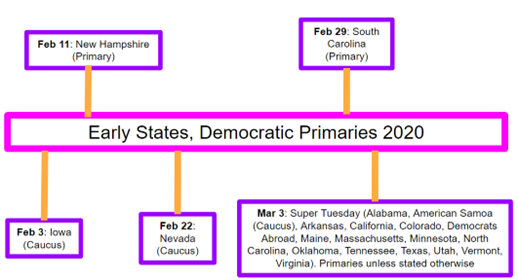
Source: 270towin.com
From mid-March onward, the remaining primary process for both parties was disrupted by the COVID-19 pandemic, with many states suspending primaries and caucuses, some multiple times. The final primary for both parties was Connecticut on August 11. At a presidential level, the Republican primary process was something of a formality, with then President Donald Trump the presumptive nominee from the start. So uncompetitive was the Republican process that seven states, including Nevada and South Carolina (see Figure 2 below), did not hold Republican presidential primaries. As returned to below, it may well be that the Democratic primary process is, at a presidential level, similar in 2024 If no serious challenge to President Joe Biden emerges from within the Democratic Party.
Figure 2 – Early States, Republican Primaries 2020
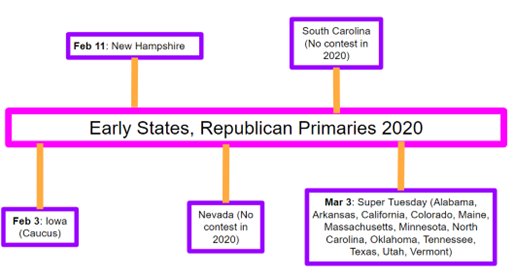
Source: 270towin.com
2024 Republican Calendar
In April 2022, when it became clear the Democratic Party was planning to re-jig the Democratic primary calendar in 2024, the Republican National Committee voted to maintain the same primary calendar for 2024 as seen in Figure 2 above. It did so in a meeting chaired by Iowa Republican Party Chair Jeff Kaufmann.
In doing so, the Republican Party illustrated the inherently political nature of this choice by making much play of the fact it was sticking with Iowa and New Hampshire as the states to kick off the Republican Party presidential nomination process. Kaufmann, for instance, tweeted ’[t]hank you @GOPChairwoman and the entire RNC for reaffirming the rules that allow Iowa to hold our First in the Nation caucuses. Iowans take their responsibility seriously and stand ready to kick off our nation’s presidential nominating process!’. Likewise, Steve Stepanek, New Hampshire GOP Chair, said ‘the RNC supports the carve-out states of Iowa, New Hampshire, South Carolina, Nevada. We do it right in New Hampshire, and the RNC sees the tremendous value in continuing this schedule for the upcoming presidential primary.’
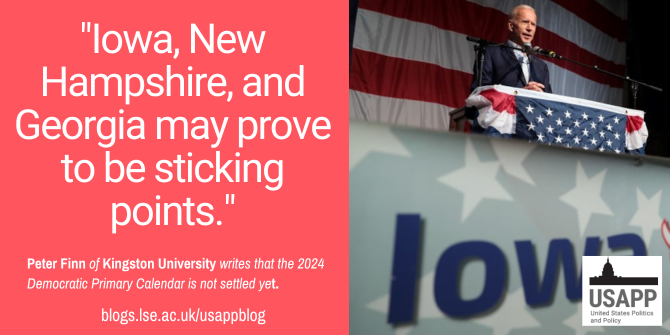
“Joe Biden” (CC BY-SA 2.0) by Gage Skidmore
Proposed 2024 Democratic Calendar
In December 2022, the Democratic Party firmed up its proposed changes to its primary calendar for 2024. Building on a letter from Biden to the Rules and Byways Committee that stated it was ‘time to update the [Democratic Party primary] process for the 21st century’, the committee approved proposals for a shake-up of the early state primaries. As seen in Figure 3 below, the proposal is for Iowa and New Hampshire to be shunted in favour of a new first five of South Carolina (February 3), New Hampshire and Nevada (February 6), Georgia (February 13), and Michigan (February 27), with all other states able to run their primaries between early March and June and Super Tuesday occurring March 5. In short, the proposals are ‘meant to signal […] commitment to elevating more variety — demographic, geographic and economic — in the early nominating process.’ As such, ‘Iowa, a largely White state that historically held the nation’s first Democratic caucus and’, as mentioned above, ‘experienced embarrassing problems tabulating results in 2020, would have no early role.’
In a meeting held in Philadelphia, Pennsylvania In early February the Democratic National Committee voted to approve the new primary calendar for the Democratic Party in 2024. Supporting the proposal prior to the vote, Democratic National Committee chair Jaime Harrison said ‘Folks, the Democratic party looks like America and so does this proposal’. Trav Robertson, South Carolina Democratic Party Chair, meanwhile said ‘It’s a big day for the state of South Carolina, and I would say not just South Carolina, but our region.’
Figure 3 – Proposed Early States, Democratic Primaries 2024
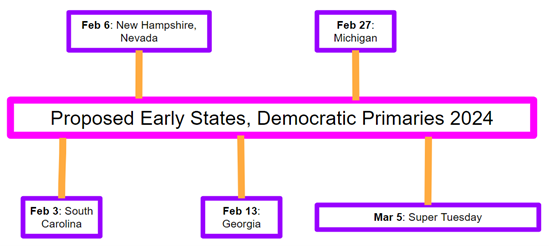
Source: Ballotpedia.com
Potential issues with the Democrats’ new Primary timetable
As of March 2023, it is not entirely clear that the proposed timetable of the Democratic Party will be implemented, and there are various hurdles and those who are opposed to the new timetable that could prevent it being put into action as currently conceived. Iowa, New Hampshire, and Georgia may prove to be sticking points.
Since the introduction of the modern-day primary system in the early 1970s, The Iowa caucus has become a staple of US presidential cycles. With candidates from both parties visiting the state in the lead up to the caucus that have (generally) kicked off the presidential selection process in both the Republican and Democratic parties. However, in recent years, objections to the primacy of the state’s role in the process has come under increasing scrutiny, not helped by the flawed technology system adopted to report the results of caucuses in 2020. There is opposition within the state to the removal of Iowa as the first state in the primary schedule, typified by Iowa Democratic Party Chair Rita Hart who said ‘it is disappointing that the national Democrats have come up with a calendar that ignores the states in the Midwest’. There is also a state law that requires the Iowa Caucus to be held eight days prior to the primary of any other state. However, they have been held closer to the primaries of other states in the past.
Likewise, having the primary a week before any other state has their primary (but not a caucus) was actually passed into law in New Hampshire in 1975. However the national Democratic Party is planning on sanctioning states who do not conform to the calendar it has set for 2024, with the potential of ‘losing delegates to the party’s national convention’. As such, JoAnne Dowdell of the New Hampshire Democratic Party argues that ‘The DNC is set to punish’ the state party ’despite the fact’ they ‘don’t have the ability to unilaterally change state law’.
In Georgia, the main sticking point is that the primary date is decided by the Secretary of State, currently Republican Brad Raffensperger. Both Georgia and New Hampshire have been given until June to alter state level laws and processes to match the national Democratic Party proposal. However, where Raffensperger has said he may be open to such a change in 2028, he is not minded to shift forward the date of the Georgia primary in 2024.
—-
If Biden manages to run for the Democratic Party nomination without a sustained challenge in 2024, then, as with the Republican Party in 2020, the specifics of Democratic state primary dates may end up being of relatively little consequence. That said, if the party can implement it, whether partially or fully, the new proposed timetable could become accepted as the blueprint for 2028 if either Biden is successful or is beaten by a Republican challenger in 2024, meaning 2028 would be a competitive primary.
- Please read our comments policy before commenting.
- Note: This article gives the views of the author, and not the position of USAPP – American Politics and Policy, nor the London School of Economics.
- Shortened URL for this post: https://bit.ly/3ZqKsao



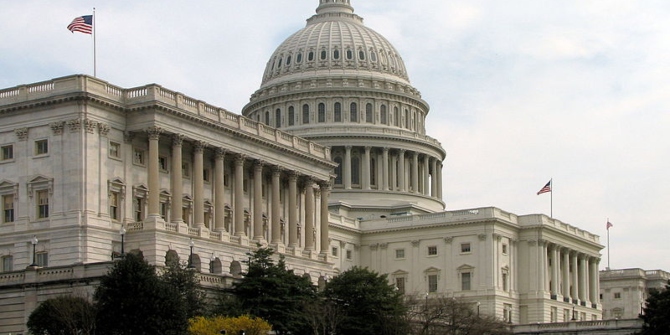



To be abundantly clear, New Hampshire will host the First in the Nation Presidential Primary for both parties. We have yet to hear what Iowa Democrats are planning. If Iowa Democrats decide to conduct a rogue Primary on the date of the Iowa Republican caucus, it will be up to the NH Secretary of State to decide if it triggers the NH law. If the NH SOS decides it does trigger the law, the NH Primary of both parties will be held one before Iowa. That’s really the only outstanding question that remains.